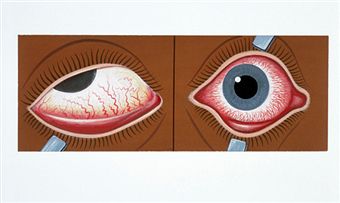What is Conjunctivitis?
Conjunctivitis is the inflammation of the transparent layer of the eye that lines the eyelid, known as the conjunctiva. This inflammation causes the blood vessels in the conjunctiva to become irritated and give off a pink or red color in the whites of the eyes. Conjunctivitis can be referred to as Madras eye, but is most commonly known as pinkeye. Both humans and animals can experience pinkeye.
What are the Symptoms of Conjunctivitis?
Many symptoms can accompany conjunctivitis.
- Red or pink coloring in the whites of the eye is the most obvious symptom
- Watery eyes is also a common symptom
- The feeling that there is something in the eye, or a gritty irritation is also common
- Itchiness, burning, and sensitivity to light may also be symptoms of conjunctivitis
- Green, yellow, or white discharge from the eye is typical, and they eyes may be sealed shut after sleeping due to the mucous-like discharge
- Blurred vision may also be present
What Causes Conjunctivitis?
Viruses, bacteria, allergies, or foreign objects or chemicals in the eye can all attribute to pinkeye symptoms.
Viral conjunctivitis often results from viruses similar to those that cause colds. Other cold symptoms may be present such as a sore throat or runny nose, and the eyes often will have watery discharges or those filled with a mucous-like substance. This type of conjunctivitis is very contagious, and usually runs its course within a week.

Bacterial conjunctivitis is also often associated with the common cold, but is caused by bacteria. Often a thick yellow or greenish colored mucous will be present in the affected eye. This material may cause the eyelids to stick together after sleeping as well.
Those with bacterial conjunctivitis may have a gritty feeling in their eye, or feel the need to try and remove foreign materials from the eye, although there may not actually be anything to remove. This type of conjunctivitis is also extremely contagious, and is more common in children.
Allergic Conjunctivitis
Allergic conjunctivitis often affects both eyes and is triggered by allergens, often during seasonal changes with pollen and other substances present in the air.
Conjunctivitis? Get Remedies Fast!
Hay fever, asthma and eczema are also common causes of allergy related pinkeye. In response to the allergens the body releases histamines, which can cause a red or pink color to the whites of the eye. Allergic conjunctivitis is not contagious.
Conjunctivitis caused by foreign chemicals or objects is also not contagious, and can be caused by a number of things. Any type of foreign object entering the eye can irritate it, causing it to become pink or red and even produce a discharge. Chemicals such as bleach that may splash in the eyes can also cause conjunctivitis. This is the shortest-lived conjunctivitis, and usually only lasts for a day at most.
What are the Risk Factors of Conjunctivitis?
Those that have eyes easily irritated by certain allergens can expect conjunctivitis when exposed to those elements, unless measures are being taken to prevent it. Likewise, whether or not a foreign object or chemical will affect a person depends upon the situation and person. However, for viral and bacterial conjunctivitis, merely being exposed to someone with this type of pinkeye can trigger the symptoms. It has also been found that those that wear contacts may have an increased risk of contracting conjunctivitis.
What are some Prevention Tips for Conjunctivitis?
Good hygiene is perhaps the best way to prevent the spread of conjunctivitis. Washing your hands frequently and not putting your fingers in your eyes are good tips to follow. You should never share eye cosmetics or personal care items with another person, and contacts, glasses, washcloths, and towels should never be shared from person to person.
Taking proper care of your contacts is also a good idea. For allergic conjunctivitis, avoiding allergens that trigger pinkeye is a good idea if possible. If you or someone in your family contracts conjunctivitis, it is important to take measures to prevent the spread of it throughout the family.
Discarding eye makeup and not wearing makeup are good ideas. Changing pillowcases and washing sheets and blankets in hot water will also be helpful.
Choosing to wear glasses instead of contact lenses may also help. You should use a cotton ball or tissue to wipe away discharge from the eye, which should be immediately thrown away and not used again. If eye drops are used to control the conjunctivitis, they should not be shared, nor should you use the same eye drops from an infected eye into an non-infected eye.
Staying home from school or work may also be necessary to prevent the spread of conjunctivitis.
What are the Test and Diagnosis Considerations for Conjunctivitis?
If you suspect that you or someone you know has conjunctivitis, a medical professional can easily diagnose it. Generally, taking a look at the eyes in a brief exam can tell a doctor if a person has pinkeye. The doctor may take a sample of the discharge from the eye that can be sent to a laboratory to diagnose exactly what type of conjunctivitis a person is suffering from.

A young child with reoccurring episodes of pinkeye may be referred to an eye specialist to try and determine what the cause may be.
What Treatment Options are Available for Conjunctivitis?
Different treatment options are available for the different types of conjunctivitis. Both home remedies and pharmaceutical treatments are available depending upon the situation. If you are unsure of what to do, it is important to contact your doctor first.
The most common home remedies for conjunctivitis include putting either warm or cool clean washcloths over your eyes. For conjunctivitis caused by allergies, cool compresses are recommended, but for bacterial or viral conjunctivitis, warm washcloths may feel better. While this method will not cure the conjunctivitis, it will provide relief. Bacterial and viral conjunctivitis usually resolve without any treatment at all, although it may be unpleasant to endure.
Marigold Plant
Another home remedy is to put the leaves of a marigold plant into cold water and to use it as eyewash. This is said to provide quick relief to the eyes. Placing cool, wet chamomile tea bags over your eyes has also been recommended as a way to decrease the redness in the eyes. Washing the eyes with chamomile flower tea has also been suggested as a way to provide relief.
Spinach and Carrot Juice
Spinach and carrot juice mixtures are also recommended during the duration of conjunctivitis. Drinking the juice of Indian gooseberry and mixing it with honey has also been suggested as a home remedy as well. Eating foods rich in Vitamin A and B2 may also be helpful in the treatment of conjunctivitis. Even using a cotton ball and placing baby shampoo over the closed eyes has been determined to provide relief for those suffering from conjunctivitis.
Each of these home remedies can be inexpensive, easy ways to provide comfort for those suffering from pinkeye, with relatively no risks to the eye when using them. However, if the home remedies and solutions do not seem to provide relief, pharmaceutical options may be necessary.
Traditional Medicine
For those suffering from allergy related conjunctivitis, seeking the help of a doctor is probably the best option. Although cool compresses and maybe even artificial tears may provide some comfort, for those with severe cases, antihistamines or other anti-inflammatory medications may need to be prescribed. Eye drops may be necessary, which can include steroids or decongestants.
Over the counter eye drops usually cost between $5-10, but they may not work as well as eye drops prescribed by your doctor. However, often these prescription eye drops can cost around $50 or $60 for a thirty-day prescription.
There is really nothing that can be done to treat viral conjunctivitis, except to let it run its course. While over the counter eye drops and warm compresses may provide some relief, time is the ultimate healer. Usually within a week viral conjunctivitis will go away on its own, although its not uncommon for it to last up to two weeks. Maintaining good hygiene is of utmost importance for those suffering from viral conjunctivitis.
Bacterial Conjunctivits
Bacterial conjunctivitis can go away on its own as well, however if the symptoms are not improving within three days, antibiotics, eye drops or ointment may be needed to cure the conjunctivitis. Ointments may be easier to administer to young infants or children, however they may blur vision for a brief time following being used. Whether it is a pill form or eye drop or ointment, prices will vary.
Generic versions are available for most options, which will decrease prices and make the treatment more affordable. Insurance should cover these treatments as well, which will help keep prices lower in most cases.
If you have contacted pinkeye from some sort of chemical or irritant, the first thing to do would be to try and wash out your eye. If water doesn’t seem to be helping the situation, or it was a harsh chemical that came in contact with your eye, a doctor will be necessary to help the situation. A saline solution rinse may be needed in order to clean the eye. This is a fairly inexpensive method.
Irrigation with Ringer’s lactate, which is saline, potassium, and calcium formula, may also be needed in the case of chemical irritants. Since permanent damage could be done to your eyes depending upon what has irritated it, seeing a doctor is advised. If nothing more, the doctor will be able to determine if you have damage or need additional assessments.
Getting Rid of Conjunctivitis
If you think you have conjunctivitis, the first thing to do is consider how you may have contracted it. Did you come in contact with something that could have irritated it? Are you allergic to something in the air? Were you around someone that had pinkeye? Do you have a cold? After answering those questions it can help you determine what type of conjunctivitis you may have. Unless a chemical has come in contact with your eye, most doctors would suggest letting the conjunctivitis run its course for a few days.
If the symptoms are too severe or you feel the need to contact a doctor, by all means do so. However, depending upon the type of conjunctivitis, there may be nothing that the doctor can do. Trying home remedies may provide relief without having to pay for a doctor visit. It is important to use good hygiene and even stay home for a day or two if you think you may be contagious. While it’s not a pleasant thing to get, conjunctivitis is not fatal, although if your eye has come in contact with some sort of chemical, there could be lasting damage. Although it can be pesky and annoying, conjunctivitis is a simple problem to fix with often minimal effort.

2 Comments
Dr. Jethro Kloss in Back to eden recommends Goldenseal tea for an eyewash, consult his book.
hi there! your information was a handful.I have a question.
my eyes is sensitive to sunlight and led lights especially its glaring.And i lack of sleep there would always be watery eyes and pinkish till i cant open my eyes.Sometimes i have to wear a black sunglasses to prevent frm it.Why does this happens ?I normally work infront of the computer up to 7hr a day and i do reduce the brightness frm the pc,i lack of sleep as well.Kindly advice me.Is there any supplements that i can consume to refrain frm this?tq